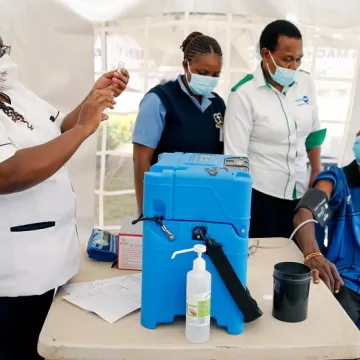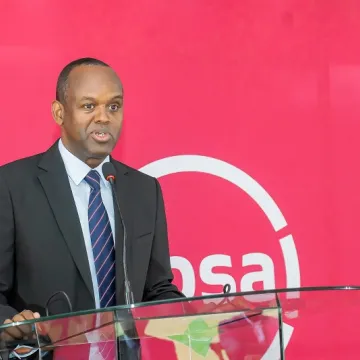Trump’s ‘Tariffs Diplomacy’ Highlights Need for More B2B Networking for SMEs Growth

Head of SME Banking at, Absa Bank Kenya PLC, Erastus Muthura.
Less than three months into his second term, US President Donald Trump is following through on his campaign pledge to use trade tariffs as bargaining chips for his country’s diplomatic, economic and national security interests with the rest of the world.
First on his sights included China, Canada, Mexico, Columbia, with threats of upcoming tariff action on the European Union and the United Kingdom.
Economists have in the past cautioned that tariffs - taxes charged by importing countries on goods and services from exporting countries - raise the cost of doing business and inflation, as price hikes are passed on to consumers.
The wave of tariffs has rekindled debate on the role and effectiveness of international trade in the growth and development of local economies. This debate is increasingly drawing in developing countries that have in the past decades recorded significant trade and development interactions with the US.
Data from the Kenya National Bureau of Statistics( KNBS) indicates that Kenyan exports to the USA dropped from Sh 79.9 billion in 2022 to Sh64.2 billion in 2023. Imports from the same country on the other hand went up from Sh93.3 billion to Sh112.7 billion over the same period of time.
As businesses worldwide continue to navigate several economic shocks including a choppy post-COVID19 recovery, geopolitical conflicts and supply chain disruptions, building international trade networks, particularly for SMEs, has become more urgent.
In Kenya, entities including the Kenya National Chamber of Commerce and Industry, KenInvest, American Chamber of Commerce and Industry and Kenya Association of Manufacturers, among others work extensively to create and maintain trade networks between firms in Kenya and those in other countries.
Such business lobby groups and export promotion councils have in recent years worked to advance the trade diplomacy agenda of their members, often leading to mutual gains for both trading partners.
They have also been instrumental in creating platforms for Small and Medium Enterprises, SMEs to explore opportunities for growth and scale through partnerships with other SMEs within the continent.
In recent years, financial service providers have also nurtured business clubs with a growing membership. Absa Business Club is among the leading networking clubs that offers firms, particularly SMEs, advisory and logistical support when exploring new markets within and outside Africa.
Upon sign-up, members of the Absa Business Club are entitled to one free foreign currency account in all major currencies, access to business overdrafts and unsecured loans, direct access to Absa forex dealers. Members, majority of them SMEs, also attend quarterly networking events, workshops and seminars as well as local, regional and international business trips.
A few months ago, the Bank in collaboration with its partners sent a delegation of dozens of Absa Business Club members to Estonia and Finland. This delegation engaged in a series of business activities aimed at unlocking new trade and investment opportunities with their European counterparts, fostering valuable business relationships and potential collaborations.
Additionally, the Bank recently dispatched another delegation of 20 entrepreneurs to the United States for similar B2B engagements which culminated into a business leadership conference.
In 2024, the Absa Business Club hosted more than 1,000 members at an inter-county empowerment forum. This event focused on exploring business opportunities for Small and Medium Enterprises (SMEs) and promoting growth in the sector across the country, amidst a challenging operating environment.
This came months after another cohort of 23 entrepreneurs flew to Cape Town for a five-day visit.
Key locations that the entrepreneurs visited include a solar panel assembler, a wine and cheese farm and a biogas energy plant. Business clubs run by banks, investment firms and SACCOs complement the work done by the lobby groups to facilitate trade linkages between firms in Kenya and prospective partners from across the world by offering non-financial services.
There is further a need to look beyond the traditional trading partners and seek out new alliances that could boost Kenya’s effort to diversify its exports offering. Countries such as Estonia, Finland, Sweden and the US have emerged as hubs for innovation, with start-ups from these countries exported to other countries and earning billions of dollars in valuations.
Business clubs in Kenya should work to form linkages with these and other countries that have in the past stayed in our peripheral view in matters of trade diplomacy.
The Writer, Erastus Muthura, is the Head of SME Banking at, Absa Bank Kenya PLC





